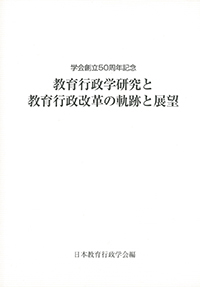50thanniv. 巻
選択された号の論文の26件中1~26を表示しています
- |<
- <
- 1
- >
- >|
学会創立50周年記念:教育行政学研究と教育行政改革の軌跡と展望
ごあいさつ
-
2016 年 50thanniv. 巻 p. 3-6
発行日: 2016年
公開日: 2019/03/20
PDF形式でダウンロード (1108K)
第Ⅰ部 教育行政学研究の軌跡と展望
-
2016 年 50thanniv. 巻 p. 8-22
発行日: 2016年
公開日: 2019/03/20
PDF形式でダウンロード (1276K) -
2016 年 50thanniv. 巻 p. 23-36
発行日: 2016年
公開日: 2019/03/20
PDF形式でダウンロード (1279K) -
2016 年 50thanniv. 巻 p. 37-48
発行日: 2016年
公開日: 2019/03/20
PDF形式でダウンロード (1232K)
第Ⅱ部 教育行政改革の軌跡と展望
●国内自治体の改革事例●
-
2016 年 50thanniv. 巻 p. 51-56
発行日: 2016年
公開日: 2019/03/20
PDF形式でダウンロード (1250K) -
2016 年 50thanniv. 巻 p. 57-63
発行日: 2016年
公開日: 2019/03/20
PDF形式でダウンロード (1256K) -
2016 年 50thanniv. 巻 p. 64-70
発行日: 2016年
公開日: 2019/03/20
PDF形式でダウンロード (1253K) -
2016 年 50thanniv. 巻 p. 71-77
発行日: 2016年
公開日: 2019/03/20
PDF形式でダウンロード (1253K) -
2016 年 50thanniv. 巻 p. 78-84
発行日: 2016年
公開日: 2019/03/20
PDF形式でダウンロード (1254K) -
2016 年 50thanniv. 巻 p. 85-91
発行日: 2016年
公開日: 2019/03/20
PDF形式でダウンロード (1362K) -
2016 年 50thanniv. 巻 p. 92-97
発行日: 2016年
公開日: 2019/03/20
PDF形式でダウンロード (1324K) -
2016 年 50thanniv. 巻 p. 98-104
発行日: 2016年
公開日: 2019/03/20
PDF形式でダウンロード (1253K) -
2016 年 50thanniv. 巻 p. 105-111
発行日: 2016年
公開日: 2019/03/20
PDF形式でダウンロード (1252K) -
2016 年 50thanniv. 巻 p. 112-118
発行日: 2016年
公開日: 2019/03/20
PDF形式でダウンロード (1255K) -
2016 年 50thanniv. 巻 p. 119-124
発行日: 2016年
公開日: 2019/03/20
PDF形式でダウンロード (1251K) -
2016 年 50thanniv. 巻 p. 125-130
発行日: 2016年
公開日: 2019/03/20
PDF形式でダウンロード (1251K) -
2016 年 50thanniv. 巻 p. 131-138
発行日: 2016年
公開日: 2019/03/20
PDF形式でダウンロード (1256K) -
2016 年 50thanniv. 巻 p. 139-147
発行日: 2016年
公開日: 2019/03/20
PDF形式でダウンロード (1264K)
●国外の改革事例●
-
2016 年 50thanniv. 巻 p. 148-153
発行日: 2016年
公開日: 2019/03/20
PDF形式でダウンロード (1269K) -
2016 年 50thanniv. 巻 p. 154-160
発行日: 2016年
公開日: 2019/03/20
PDF形式でダウンロード (1254K) -
2016 年 50thanniv. 巻 p. 161-167
発行日: 2016年
公開日: 2019/03/20
PDF形式でダウンロード (1315K) -
2016 年 50thanniv. 巻 p. 168-173
発行日: 2016年
公開日: 2019/03/20
PDF形式でダウンロード (1252K) -
2016 年 50thanniv. 巻 p. 174-179
発行日: 2016年
公開日: 2019/03/20
PDF形式でダウンロード (1319K) -
2016 年 50thanniv. 巻 p. 180-186
発行日: 2016年
公開日: 2019/03/20
PDF形式でダウンロード (1258K) -
2016 年 50thanniv. 巻 p. 187-192
発行日: 2016年
公開日: 2019/03/20
PDF形式でダウンロード (1252K) -
2016 年 50thanniv. 巻 p. 193-199
発行日: 2016年
公開日: 2019/03/20
PDF形式でダウンロード (1210K)
- |<
- <
- 1
- >
- >|
